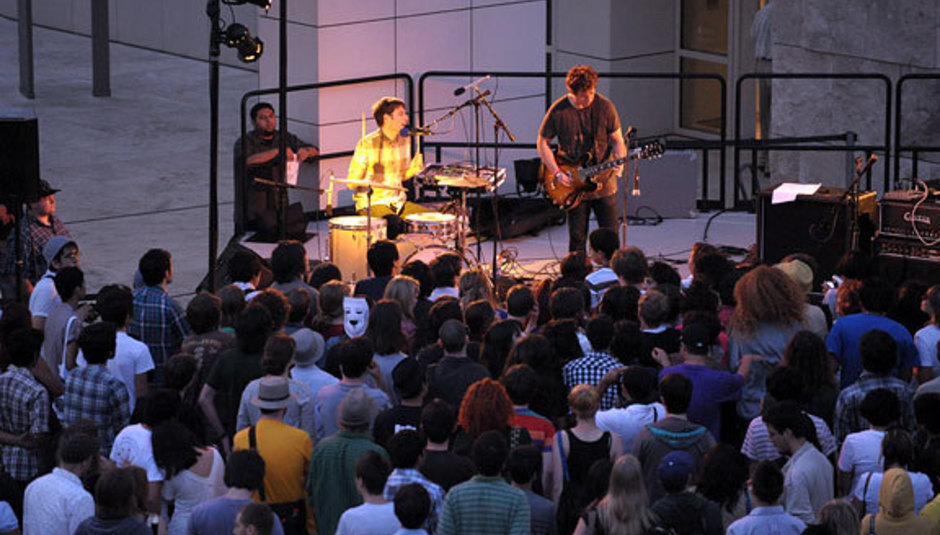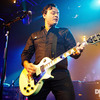DiS' two favourite live band of the past decade both hail from LA, they are HEALTH and these two guys called Dean & Randy. We've somehow managed to book both bands to play our 10th Anniversary events which take place in Sheffield on a rollerskate rink this Friday and in Manchester at the In the City festival next week.
DiS' editor swanned off to LA a few weeks ago to grab a burrito and to catch up with the duo who have blown our minds and worried our ear drums over the past 10 years in Wives and now as No Age, to get a sense of what it is that drives the cogs behind their incredible live show...
NO AGE on Duos
DiS: So, duos, there’s been a lot of them in the past 10 years...
Dean: Yeah. Duos, yeah, what’s up that? But we’re a live trio now...
Do you think the rise of the duo, like The Kills, Blood Red Shoes and yourselves is more to do with economics?
Randy: Definitely.
...or technologies making it possible?
Dean: I know for us economics is a factor. And, like writing music with just us two allows for more experimentation. There’s only two people’s decisions to deal with.
Randy: I know for us the set up helps with the politics of a band. When you have a lot of people making decisions it can take a while to get things decided...
Dean: ...too many cooks.
Randy: Yeah, with two people it streamlines the decision making process. I dunno why duos are easier.
DiS: Do you think loop pedals have helped duos evolve in the same way they have for solo folks like Owen Pallett and Andrew Bird have done? I can’t think of many rock duos in the 90s...
Dean: Yeah. I can’t think of many. There was godheadSilo
Randy: The Flat Duo Jets which was garage rock stuff. Er...
DiS: In dance there was Chemical Brothers and Daft Punk but that’s just two dudes pressing play, do you think it’s like skateboard tricks, where rock bands needed to see something being done to give it a go?
Dean: For rock music you need like, the rhythm, really. You need like low-end bass and lead guitar, so there’s lots of three pieces but with two pieces it’s hard to navigate that.
Randy: Then you go back to like your Hall & Oates and Simon & Garfunkel and things like that.
DiS: Who was your favourite duo of the past 10 years?
Randy: I think probably Lightning Bolt, they’re pretty out there and awesome.
Dean: Mika Miko. They’re, like, so good.
NO AGE on live shows...
You’re playing for us on a Roller Skate rink and you’ve played on a bridge in Austin during SXSW. Why do you think traditional venues suck so much?
Dean: Totally, our choices of context are very intentional. I feel like ‘why do you want to play in a black box, really?’ I think the main is, you go play a regular venue and it’s about the business of it. The only reason why we’re here is there’s a promoter and a permit to sell alcohol and everyone’s just trying to make money off of people.
Randy: And yeah, with traditional venues you’ve gotta go past security, get patted down, stand in line, stand there, have fun, then get the fuck out, it’s a very controlled thing which for me as an audience member, I felt frustrated and wanted to see something a little different on stage or experience something that was creatively cathartic or a revelation to me but having to go through the whole ritual of being processed in and out. You know, like some places you can’t even bring pens, and I’m like ‘you know you’re treating me like I’m fortunate enough to walk into your box’. For me, as an audience member, it was sort of stifling, having all these restrictions on the audience. When we started playing I liked the idea of the audience not having to go through that ritual.
Dean: I think also, at a young age, we were fortunate enough to go see bands, in different places. Like, my first experience seeing a band was the Legion Hall. Or even like the Smell or the PCH Club, whenever I think of my favourite concerts they were places that weren’t supposed be there or they were really DIY.
DiS: So the Smell, the notorious venue, tell us all about it...
Dean: Yeah, shit’s been around now like 12 years. I think the first time I was sixteen or something and really I think The Smell has a big influence on us, and to a lot of our friends, about where we think about playing. To a lot of people, that place, hands down, was the coolest and best place, on a lot of levels.
Randy: What made it great was there was a five dollar cover charge. It was just an empty place where bands could play wherever they wanted. It was all ages because there’s no alcohol.
Dean: And now it’s permanent, but before it was just of a space and we maybe weren’t supposed to be there. When we were Wives, people were like ‘do you wanna play this regular venue like the Roxy or Knitting Factory?’ and I was like ‘why the fuck would I wanna play there, I can play here?’ and they’d go ‘but you play there every week?’ and be ‘yeah, I’d rather play here every week than some shitty venue’ because the music we were and we are now making just doesn’t feel right because the statement just doesn’t make sense in that context.
Randy: Going back to what I said about being in the audience and the expectation... when you go into these standard clubs , you know what to expect and what you’re supposed to do as a member of the audience. For us, putting on a show in a different sort of space, it’s a difference experience because there’s no set expectation, Like you’re on the side of a mountain or you’re in a ravine by the river, and as an audience member you’re like ‘I don’t know what can happen, I’ve never been here before, am I supposed to be here?’ Anything can happen, that’s the beauty of it. When I’ve gone to see shows in different sorts of locations, I’m like ‘I’m gonna climb this tree’ or whatever, I’m gonna react to the music in a different way because I feel less fettered and less restricted because there’s no sense of expectation of how I should react to the band.
Dean: Don’t get us wrong, I think regular venues are a great place for people to go and see music and bands to go and play and make music. I don’t want to make it sound like we’re anti-venues or anything. We think about the audience, mainly, because when we were kids and we saw anything out of the ordinary it was also way-more special. It’s hard to get that special feeling at a venue when they’re herding you in, the band plays and it’s done.
DiS: Live shows seemed to have shifted up a gear overall. I mean, at the start the decade there was At the Drive-In and Les Savy Fav but something seemed to change in terms of the energy and ideas around the middle of the decade when bands like yours formed and Justice Dan Deacon, etc came on the scene...
Dean: I know what you mean. When we were growing up, like before the past 10 years, when we were teenagers, there was the math-rock or whatever pre-emo, and live shows were quite a somber thing with guys standing onstage. There was a cultural reaction to that where bands really did something exciting live.
DiS: Like the rise of Black Flag and Fugazi?
Dean: Yeah but I guess at the beginning of the 2000s the two bands who seemed to be the main two comparisons were ‘Fugazi meets Sonic Youth’, so I dunno why that was.
DiS: What’s been your favourite place you’ve played of all the gigs you’ve played... in fact how many gigs have you played?
Randy: I have no idea how many gigs we’ve played, maybe we can run some kind of competition for whoever manages to tot it all up?
Dean: I really liked Moma, in New York, that was really cool.
Randy: The Getty Center in LA was awesome. (pictured above from losanjealous.com
Dean: Yeah, for us getting to play museums, libraries and tourist attractions like that is so cool and funny. They don’t really have bands play that much so it’s really odd.
DiS: Do you have many places left on your wish list of places or spaces you’d still like to play?
Dean: Yeah, lots, I just can’t think right now. At one of our friends houses, there’s this mountain, and we want to play up on the peak. Sometimes I like the idea of playing a house to 10 people but I like playing big places too, it just depends. I like the contrast and getting the best of both worlds of festivals. Seeing a band in a house environment is just the best experience, and you’re not supposed to see a band in there and we always think about how we can re-create that feeling a bigger level.
DiS: Do you think the way people watch shows through view finders is damaging gig experiences?
Dean: Yeah and people texting while you’re playing?! It’s stupid. It I guess might heighten the experience somehow, perhaps but I dunno. People are documenting everything and everytime you goto a gig now nearly everyone has a camera or a cameraphone.
Randy: Now people have pictures of bands playing and stuff. I know before they used to tell you, you couldn’t bring cameras into gigs and stuff. They can’t stop you taking a cellphone in. So a lot of shows is just photos.
Dean: I remember going to see bands when we were young and you’d bring a disposable camera and you’d take one picture, and it’d be all shitty but it was cool. It seems like people are now lost in the infinite.
Randy: There’s now a lot more good photos out there but I don’t know how I feel about it. The best thing about those disposable cameras was you’d get your roll of film back and it’d be all weird with your thumbs in front of it and blurry and all that. It was all awkward or weird. I dunno if it’s better or worse.
DiS: There are stories of the live industry and the live music business is suffering, how do you feel about that?
Dean: Yeah, I heard about this on NPR recently, how Christina Aguilera’s tour is really suffering but she’s just like Fortune 500 businesses, they’re all suffering, that’s just big business like Walmart. Like Christina Aguilera is, like, Walmart.
Randy: If you’re trying to sell out stadiums and you can’t sell out stadiums for $80 or $150 dollars, that’s just crazy. And the crew is 5 trucks and so many people, and I can kind of respect that. I guess it’s just good business, in the truer sense of the word good, to not be excessive and sell something at a fair price that people are going to goto. I think that’s difficult to do. The whole TicketMaster and LiveNation world of things just doesn’t really work.
Dean: I guess it’s just one of those things. It’s a cycle. Like all those car companies going under and well, you’ve been gouging all your customers for all these years, and you’ve made all these excesses of money from your customers, and such high profit and your high profit is now a small profit, is that really a downturn? Just look at the excess of it. I mean, like The Rolling Stones or someone, who’ve been charging like $200 for shitty seats in stadiums for the last 20 years, so maybe things have come back to reality a little.
DiS: It’s like unsustainable farming practices...
Dean: Yeah, you’ve bled your audience dry. I think if everyone had more respect for the audience and business runs of making profits, and I totally understand that and I’m not saying businesses shouldn’t make a profit but I also think there needs to be more of a balance to it all, so it makes a little bit more sense. It’s just about respect and being respectful to people. I mean, I can’t imagine the last time Mick Jagger bought a stadium ticket. I mean for us, we still goto a lot shows but I’ll still go see The Rolling Stones with my mum, so I can see both sides of the experience.
Randy: Your mum loves them.
Dean: Yeah, and when her money isn’t great, she can’t spend $400 on Rolling Stones tickets. Everything just has to adjust.
Randy: For us, our music is personal, so we like to play in places that are sort of unconfortable.
Check back tomorrow for Part II as part of our special No Age week. No Age are currently on tour in the UK and play Drowned in Sound’s Rollerpolooza in Sheffield on Friday and our 10th Birthday party in Manchester at In the City next Wednesday. Their new album Everything in Between is out now via Sub Pop.






















